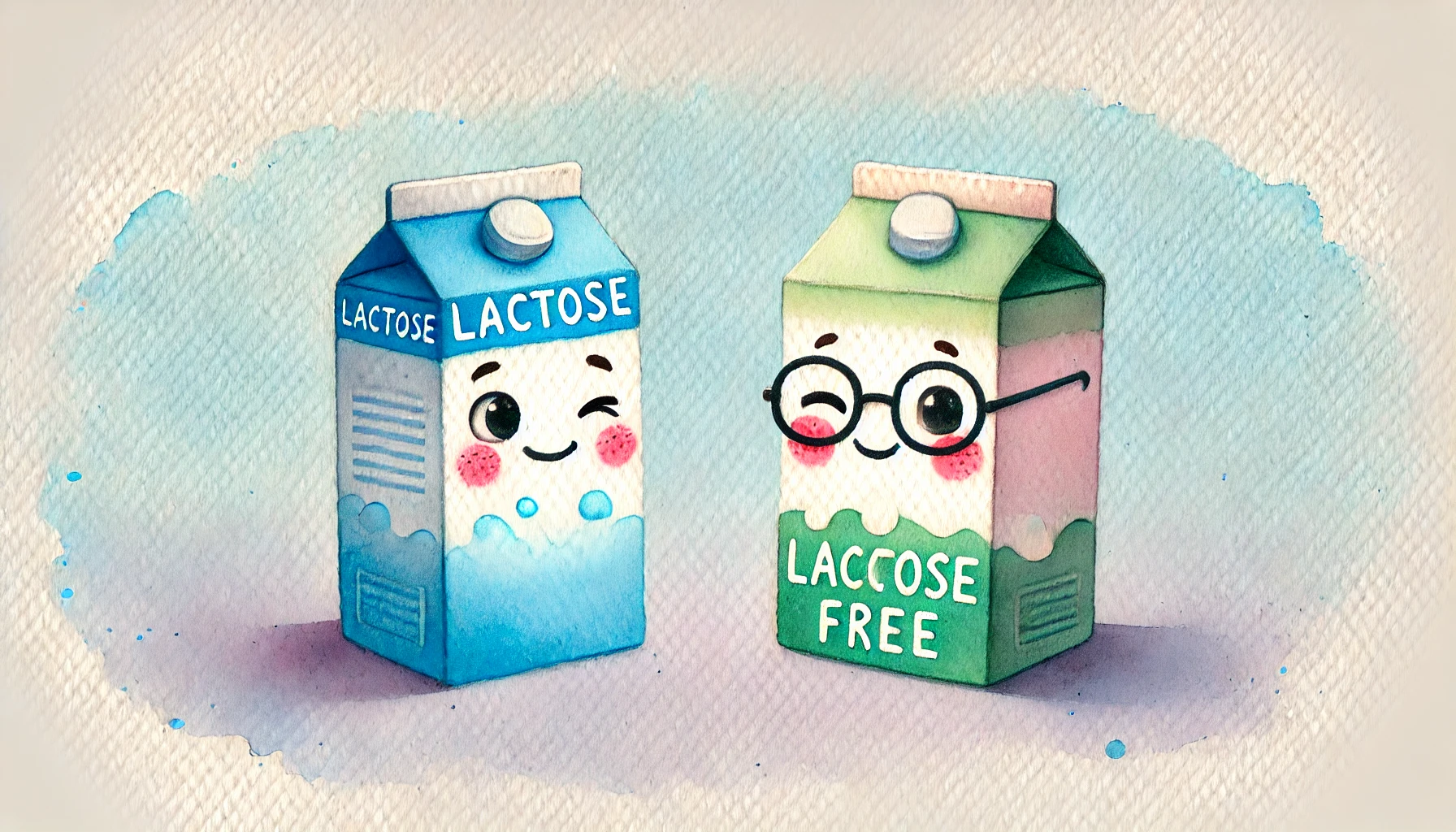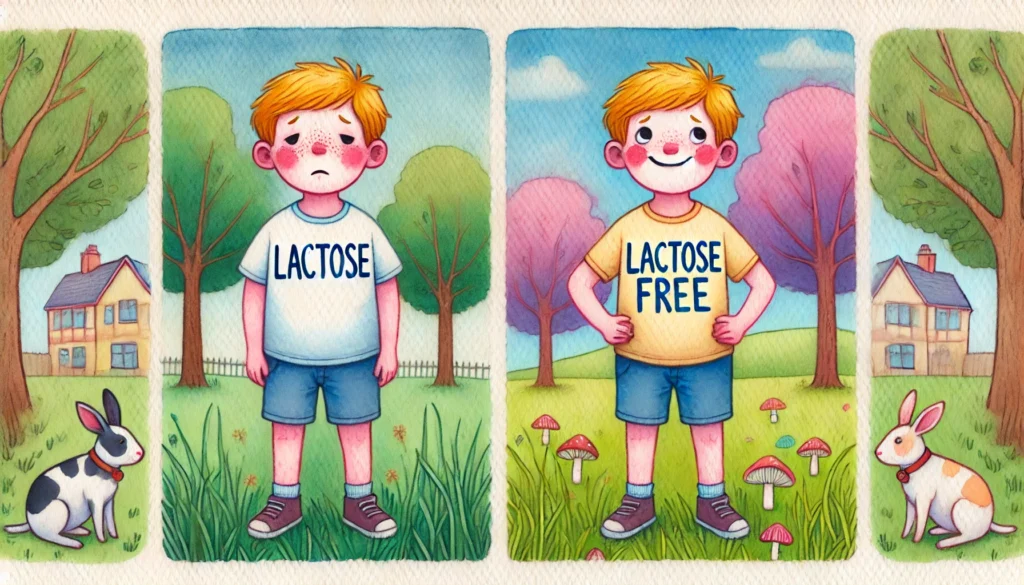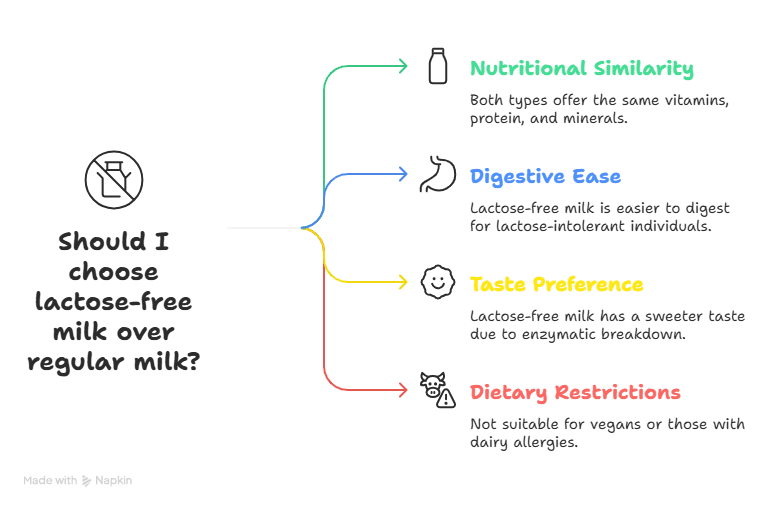The Straight Up Lactose vs. The Lactose-Free Dilemma

Is Lactose-Free Better Than Lactose?
Ever found yourself standing in the dairy aisle, staring blankly at two nearly identical cartons of milk—one proudly boasting “Lactose-Free” in bold letters, the other just…milk—and wondering, What’s the difference? Is one secretly better for you? Are you missing out on a health revolution if you’re still team lactose?
It’s a modern milk dilemma. Celebrities, influencers, and your neighbor who’s suddenly “off dairy” seem to swear by lactose-free everything. Meanwhile, your stomach has never raised a red flag after a bowl of cereal—so… do you need to switch?
In this blog, we’re pouring over the facts (pun fully intended). We’ll break down what lactose-free milk actually is, who benefits from it, and whether it’s a nutritional game-changer or just clever marketing.
Spoiler alert: The answer depends on your gut—literally.
What Is Lactose-Free Milk, Really?
Let’s start at the very beginning—because before we judge a carton by its label, we need to understand what that label actually means.
Lactose is a naturally occurring sugar found in milk and dairy products. In order for your body to digest lactose properly, it needs an enzyme called lactase. Most babies have plenty of it. But for many adults—especially as they age or depending on genetic background—lactase production drops off. When that happens, lactose doesn’t get broken down in the small intestine and ends up fermenting in the gut. The result? Bloating, gas, cramps, and an awkward relationship with dairy.
Enter: Lactose-free milk.
Instead of removing the lactose entirely, manufacturers add the enzyme lactase directly into the milk. This pre-digests the lactose for you—breaking it down into two simpler sugars: glucose and galactose. These sugars are much easier on the digestive system and, bonus, they taste a bit sweeter.
What’s important to note? It’s still real milk—from the same cows, with the same protein, calcium, and vitamins. Nothing essential is taken away. You get all the nutritional benefits of regular milk, without the digestive drama.
Think of it as milk that’s been through a bit of conflict resolution therapy: same personality, less friction.
Nutritional Face-Off: Identical or Not?
Let’s clear the cream: Lactose-free milk and regular milk are nutritionally identical. That’s not marketing spin—it’s science. Both contain the same essential nutrients that make dairy a dietary powerhouse:
- High-quality protein for muscle repair and satiety
- Calcium and phosphorus for strong bones
- B vitamins for energy metabolism
- Vitamin D and A (often added) for immunity and vision support
So if you’re worried that going lactose-free means sacrificing nutritional value—breathe easy, dairy lover. Nothing important is lost in the process.
Now let’s talk sugar, because this is where confusion curdles.
When milk is made lactose-free, the lactose is broken down by lactase into two simpler sugars: glucose and galactose. This makes the milk taste sweeter—but and this is critical—no sugar is added.
That sweetness? Pure chemistry.
That extra sugar on the label? An illusion caused by how sugars are now classified—not because anything was dumped in from a bag.
🧃 Myth alert:
“Is lactose-free milk full of sugar?”
Nope. It just tastes like it is. Same sugar content, different form. It’s like rearranging furniture in a room—it looks different, but nothing new was brought in.
Digestive Dynamics: Who Really Needs It?
Here’s where we separate the milk drinkers from the milk dodgers.
Roughly 65–70% of the world’s population is lactose intolerant to some degree. That means their bodies either don’t produce enough lactase or none at all. The result? Undigested lactose travels to the large intestine, where it ferments like a failed science experiment—and the symptoms hit:
- Bloating
- Gas
- Cramps
- Diarrhea
- Bathroom roulette every time cheese is involved
For these folks, lactose-free milk is a digestive lifesaver. It offers the taste and nutrients of dairy, minus the internal rebellion.
But here’s the kicker:
If you’re not lactose intolerant—if you can enjoy a latte, yogurt, or a slice of pizza without symptoms—there’s zero medical reason to switch. Your body’s doing just fine digesting lactose the natural way.
That said, some people still prefer the slightly sweeter taste or feel better cutting back on dairy overall—but nutritionally speaking? No benefit, no bonus points.Bottom line:
Lactose-free isn’t a health upgrade—it’s a solution for a specific digestive issue. If your gut’s not in distress, your regular milk is doing just fine.
Taste Test: Sweet Surprise or Recipe Ruiner?
Let’s address the unexpected elephant in the fridge: lactose-free milk tastes sweeter—even though the sugar content hasn’t increased.
Why? Science.
When lactase breaks down lactose into glucose and galactose, your taste buds perceive those simpler sugars as sweeter—even though nothing has been added. It’s not a sugar bomb; it just feels like one.
🎯 Where that sweet boost shines:
- Coffee or lattes – no need for added sugar or syrup
- Cereal – especially with unsweetened or high-fiber brands
- Smoothies – blends better with fruit-forward flavors
It’s like a stealth sweetener—but from within.
🥄 Where it might be…awkward:
- Savory sauces – think béchamel or cream-based pasta sauces
- Soups or chowders – unexpected sweetness can throw off balance
- Baking – may require taste testing if precision is key
But here’s the chef’s secret: You can absolutely cook and bake with lactose-free milk. The consistency, fat content, and protein structure remain unchanged, so it behaves the same in recipes—just keep the sweetness in mind and adjust accordingly.In short: lactose-free milk is versatile enough to sub in across the board—but it’s always smart to taste as you go. Especially when making, say, a cheese sauce you don’t want to taste like dessert.
Suitability Check: Who Should Still Avoid It?
Let’s set the record straight:
* Lactose-free milk is still dairy.
It comes from cows. It contains milk proteins like casein and whey. It’s not for everyone.
🚫 Not suitable for:
- People with dairy allergies – who react to milk proteins, not lactose
- Vegans – who avoid all animal products, regardless of lactose content
- Anyone on a strict dairy-free diet – whether for medical, ethical, or dietary reasons
Swapping lactose-free for dairy-free won’t cut it in these cases. That latte may be lactose-free, but it’s still mooing at heart.
💸 Let’s talk cost:
Lactose-free products often come with a higher price tag—sometimes 20–30% more. And while they’re widely available in most supermarkets now, availability can still be spott in rural areas or smaller stores.So if you’re reaching for lactose-free milk just because it seems healthier or trendier—consider your needs. If your gut isn’t struggling and your wallet is, regular milk might still be your best bet.

So… Is It Better?
Let’s settle the score.
Is lactose-free milk better than regular milk? That depends entirely on who’s asking—and more importantly, how their body handles lactose.
🟢 For the lactose-intolerant:
- Yes. Unequivocally. Lactose-free milk is a game-changer—offering the full nutritional benefit of dairy without the digestive chaos. You get your calcium, protein, and vitamin D without the gas, bloating, or urgent exits from dinner parties. That’s a win.
🟡 For the lactose-tolerant:
- Not necessarily. If your gut happily digests lactose, there’s no health reason to switch. Nutritionally, both types of milk are nearly identical. You might prefer the slightly sweeter taste of lactose-free, but it’s a matter of flavor—not function.
🧭 Use-case verdicts:
- If milk gives you digestive drama → Lactose-free is your friend.
- If you’re symptom-free but prefer a sweeter taste → Go for it, but know it’s not a “healthier” choice.
- If you’re dairy-free, allergic, or vegan → Lactose-free milk still isn’t for you. Look to plant-based alternatives.
So is lactose-free better?
Only if your body needs it. Otherwise, milk is milk—sweetened or not.
Key Takeaways / TL;DR
Here’s the quick-pour summary for those in a rush:
- 🥛 Nutritionally similar: Lactose-free and regular milk both offer the same vitamins, protein, and minerals.
- 💨 Digestively different: Lactose-free milk is easier to digest for people with lactose intolerance (~65–70% of the world).
- 🍯 Taste is sweeter: Natural enzymatic breakdown makes it taste sweeter—no sugar added.
🚫 Not for vegans or dairy allergies: It’s still cow’s milk and contains dairy proteins.

Final Thoughts
At the end of the day, the “better” milk comes down to one thing: how your body feels after drinking it.
If you’re sailing through dairyland without digestive distress, regular milk has you covered. But if milk leaves you feeling like a human balloon, lactose-free could be the golden ticket to comfort and nutrition.
So here’s the move:
* Try both and see what works for you.
* Let your belly be the judge.
And hey—this isn’t a one-size-fits-all conversation. Everyone’s gut is a little different. If you’ve already made the switch, or if you’ve found creative ways to use lactose-free milk (sweet or savory), drop a comment below!
👉 What’s your go-to recipe using lactose-free milk?
👉 Did you notice a difference in taste—or digestion?
Let’s talk dairy decisions. 🥛💬
🧠 FAQ: Lactose-Free Milk, Decoded
1. Is lactose-free milk the same as dairy-free milk?
Nope — big difference! Lactose-free milk still comes from cows. It simply has the lactose (milk sugar) broken down for easier digestion. Dairy-free milk, on the other hand, is made from plants like almonds, oats, or soy and contains no dairy at all.
2. Does lactose-free milk have added sugar?
No added sugar here! The sweetness comes naturally from the enzymatic breakdown of lactose into glucose and galactose — both naturally sweeter tasting sugars.
3. Can I cook and bake with lactose-free milk?
Absolutely! It behaves just like regular milk in most recipes. The slight sweetness might stand out in some savory dishes, so taste and tweak if needed.
4. Is lactose-free milk healthier than regular milk?
Nutritionally, they’re nearly identical — same protein, calcium, and vitamin content. The “healthier” option depends on how your body handles lactose.
5. Who should avoid lactose-free milk?
Anyone with a dairy allergy, a vegan diet, or a strict dairy-free lifestyle should skip it. Lactose-free ≠ dairy-free.
